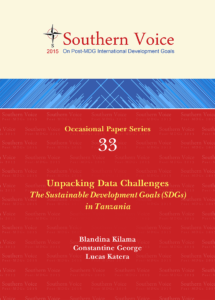This article aims to highlight the challenges of collecting qualitative, disaggregated data. It does so by using the case study…
 Following the successful completion of Phase I of the project, “Unpacking the Data Revolution” in Tanzania, the second phase was undertaken with the aim to explore in further detail those SDG monitoring areas that face particular data challenges. The objective is to increase understanding of these challenges, explore their implications and identify possible solutions. This paper focuses on two particular goal areas that have been identified for Tanzania to have significant data gaps, namely environment and governance. The present paper shows that in case of environment, data collection suffers from limited spatial coverage. As for governance, the available data is highly reliant on perception surveys. Findings reveal that although both these two goals have been given the necessary attention in previous national strategies, the availability of data for measuring progress towards selected targets is significantly lacking. Therefore, it is essential to build data capture capacity to facilitate the monitoring and assessment of indicators for environment and governance-related goals. The present paper suggests to improve coordination between data collectors in Tanzania, especially between the National Bureau of Statistics (NBS) and other agencies that collect routine (administrative) data to ensure the harmonisation and comparison of data from these different sources.
Following the successful completion of Phase I of the project, “Unpacking the Data Revolution” in Tanzania, the second phase was undertaken with the aim to explore in further detail those SDG monitoring areas that face particular data challenges. The objective is to increase understanding of these challenges, explore their implications and identify possible solutions. This paper focuses on two particular goal areas that have been identified for Tanzania to have significant data gaps, namely environment and governance. The present paper shows that in case of environment, data collection suffers from limited spatial coverage. As for governance, the available data is highly reliant on perception surveys. Findings reveal that although both these two goals have been given the necessary attention in previous national strategies, the availability of data for measuring progress towards selected targets is significantly lacking. Therefore, it is essential to build data capture capacity to facilitate the monitoring and assessment of indicators for environment and governance-related goals. The present paper suggests to improve coordination between data collectors in Tanzania, especially between the National Bureau of Statistics (NBS) and other agencies that collect routine (administrative) data to ensure the harmonisation and comparison of data from these different sources.
Authors: Blandina Kilama, Constantine George, Lucas Katera

